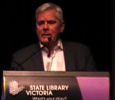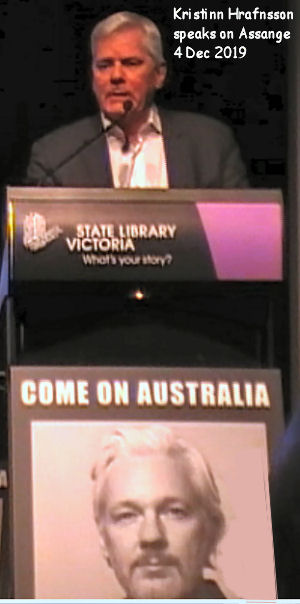Video & transcripts from event: "What is Happening to Julian Assange & Journalism?" (4 Dec 2019 )

 Suelette Drefus, Julian Burnside, Kristinn Hrajnsson, and Lizzie O'Shea were the main people in this event. I have transcribed some of Suelette Drefus, Technology Researcher and Author's excellent summary of Julian Assange's contributions to the public internet and free software. She also displayed courage in criticising powerful people on stage. At around 1h 44m into the video she has the courage to criticise corporate media journalist, Peter Grest, for his repetition of opinions used to slur Julian's credentials as a journalist and publisher. Interesting to wonder why Grest was released without explanation after an international outcry from the same western block that is either persecuting Assange or leaving him to rot.
Suelette Drefus, Julian Burnside, Kristinn Hrajnsson, and Lizzie O'Shea were the main people in this event. I have transcribed some of Suelette Drefus, Technology Researcher and Author's excellent summary of Julian Assange's contributions to the public internet and free software. She also displayed courage in criticising powerful people on stage. At around 1h 44m into the video she has the courage to criticise corporate media journalist, Peter Grest, for his repetition of opinions used to slur Julian's credentials as a journalist and publisher. Interesting to wonder why Grest was released without explanation after an international outcry from the same western block that is either persecuting Assange or leaving him to rot.
The film of the event is now on twitter broadcasts. The introduction to the main speakers starts around 17.40 minutes:https://twitter.com/i/broadcasts/1YqKDnymbLwJV?fbclid=IwAR2MhE7PGdDm6ZN0lbSn25y5AdS9QQftWBsJZ_uOpZUDua_3WZPRb5bi74c
Excerpts from Suelette Drefus's comments on Whistleblowers round the world.

[Suelette Drefus has known Julian Assange since about 1994. From https://en.wikipedia.org/wiki/Suelette_Dreyfus: She is a technology researcher, journalist, and writer. Her fields of research include information systems, digital security and privacy, the impact of technology on whistleblowing, health informatics[6] and e-Education. Her work examines digital whistleblowing as a form of freedom of expression and the right of dissent from corruption. She is a researcher and lecturer in the Department of Computing and Information Systems at the University of Melbourne, as well as the Principal Researcher on an international research project on the impact of digital technologies on whistleblowing.]
LIZZIE O'SHEA ATO whistleblower, Richard Boyle, may get 161 years in prison for ...
SUELETTE DREFUS: Whistleblowers. The good news is they are at least being properly recognised as whistleblowers. The bad news is we have a long way to travel yet. The ATO Boyle case... this is not some obscure thing in another country outside Australia. This is a whistleblower who blew the whistle on the ATO about not following its own policies and procedures about garnishing money out of peoples' bank accounts. [...] It's really important to follow policies and procedures because otherwise you end up with an authoritarian state, which is not what we all signed up for.
But it's not only the Boyle case. It's internationally. Its the Jeffrey Sterling case of a former CIA officer who was a whistleblower. This case is very interesting ... in the United States because we think it's the first case where a whistleblower has been convicted on the basis of metadata. [...] we have the little electronic bread crumb trail. [...]
We've seen another disturbing trend. In Europe we've seen the Anna Garrido [Ramos] case in Spain. She worked in the Madrid town hall. She revealed corruption at a local level, and ten years on, the truth came out. It went all the way up to national politics and caused the fall of the government and president in Spain.
We've seen the case of Andreo Franzoso, revealing fraud in a state-owned company in Italy. And Antoine Deltour, the Luxleaks case, revealing sweet deals by his government behind the scenes - tax lurks for large multinational companies. We've seen the Gupta case in South Africa - cosy ties between a wealthy family and the president's office. And we've also seen the John Doe case and the Panama Papers.
One of the most disturbing trends that we've seen, however, more recently, in Australia, is that government is not only going after whistleblowers; it's now going after the journalists, as we've heard recently. It's going after the lawyers, in the case of Bernard Cleary. And, I might say, earlier this year, I was due to speak at the largest cybersecurity conference in Australia, and merely, for floating the idea as a thought-bubble in a conversation about my talk - of maybe it would be interesting to have a teleconference at the conference with Edward Snowden - I was actually censored from speaking at the conference. I was disinvited from the conference, in part because I was told, I might say things that weren't representative enough of Australian values. I like that - 'Australian values'. It's important that our cybersecurity centre should be the organisation whose mission statement is to set Australian values, but the idea that, because I had spoken out on issues regarding whistleblowing and the impact of digital technologies on it, somehow I was too 'dangerous' to speak. It's quite extraordinary. So now, it's not just the lawyers, it's not just the journalists, it's not just the whistleblowers, it's also the academics.
But I did want to say one bit of hope. There is a little bit of shining light in here. And this is again a contribution that I think Wikileaks has made to the landscape. There has been a significant expansion in the number of laws around the world. [Continues to talk about the laws. Julian Burnside interjects to say that the Australian law doesn't work.]
[...]
Assange before he became an asylum-seeker
SUELETTE DREFUS: I've known Julian for a very long time. I got to know him around 1994. [...] We got to know each other in part because he was co-running the first free public access internet site here in Australia. And it was a haven for artists and writers and activists and creatives, programmers - people who wanted to contribute things to the community. And even then he was an [?] publisher. He would allow people to publish things on the site which were controversial and difficult, including articles backed up by evidence, scientology, and a set of other things. And he was pretty bright. He dealt with lawyers' letters and threats, and other assaults on it, but he was willing to stand up for it. And I knew him all during this period because he was very involved in the Free Software movement. Those of you who don't know much about the technology side of things, you obviously know Julian has not just got technical skills, but you may not know that for more than a decade, he contributed an enormous amount - thousands and thousands of hours to developing free software. And, in fact, for some of you who might use an Apple computer, there is probably free software in there by Julian Assange. So, he wrote software that helped to develop one of the operating systems - a variety of Unix. Julian did all of this labour for free and he wrote software that helped make the news function of the early internet function in a more optimized way, which was easier for more people to get news. He designed and wrote - and I was part of the project - then developed the first opensource software that was deniable cryptography file system. This was envisaged to be used by human rights groups around the world. It allowed you to store, for example, on a hard drive, multiple layers of encrypted files, so that, if a human rights workers taking witness statements, are in Guatamala - that genocide against the original peoples [?Cambodia], in Sri Lanka - took witness statements in rural areas and put them on these hard drives they could add a layer of something else on the top, with a different password and, if they were seized and tortured, they could give the password to that layer with very little information on it, and the other layer would never be discoverable. He wrote free software available - gave it away - to everyone, which allowed people to test the cybersecurity robustness of their computer systems connected to the internet. Much of this is not known about Julian. And, it's an incredible act of altruism to contribute in a free software community, but that, in itself, was many years of work.
[...]
Contribution of Wikileaks to National Security Reporting
LIZZIE O'SHEA: [...] What was the particular contribution of Wikileaks to this field of National Security reporting? It's obviously Wikileak's mode of publishing [...]access to source material [...] talk about that from the perspective of a journalist.
SUELETTE DREFUS: [...] So, a lot of the media has focused on all sorts of criticisms of Julian that are [?] pedantic, small mind things, but has missed the big picture, and that's unfortunate. Because, if you look at the ways in which he, as the editor of Wikileaks, has formed how we receive news and information, they are quite extraordinary. So the anonymous digital drop-offs are a Wikileaks invention. We look around today and we see the New York Times, Bloomberg media, Gizmodo, for those of you who use it, NBC, [?] Norwegian, CBC, which is the ABC of Canada, as well as the ABC here, using anonymous digital drop-offs for whistleblowers to provide information to journalists in the public interest. That came about because of Julian Assange. We see the popularised use of data set journalism. That is, taking large sets of data, analysing it, and looking for patterns, trying to understand what's really happening, and then tell people the story. That is largely because of Julian Assange. We see the kind of invented verification journalism, that is, not that you just do the analysis with the data set, but you publish it with the story. You do that to prove to your readers the story you're telling is truthful. And that's extra important in an era of fake news. That is largely true and popularised because of Julian ASsange. We see collaborative global partnerships in journalism accross countries and publications on a scale that was never seen before, across different countries and organisations, from 90+ different organisations, not in the same company, not in the same media family, because of Julian Assange. And we see a popularisation of cybersecurity training of journalists - much more widespread. I've been very active in some of it. That has largely happened because of Julian Assange. So, these are all really important innovations for journalism, but it actually goes beyond that. We are sitting in a state library. Libraries are valuable archives of information. Julian Assange and Wikileaks has created perhaps the most important archive on line library of information, of data, around international - US international - public policy-making and decision-making - particularly of war-decisions; war-policy, that, for the modern era, exists today. And is not behind closed walls in a private collection. It's not even inaccessible, in books on a shelf; it's available to everyone free today. And that is because of Julian Assange's vision. So, I think those are all things that are really important to recognise, that in their totality are extraordinary. Any one of them would have been a kind of life-time achievement for someone who is a publisher, a journalist, who cares about access to public information, but all of them together provide a life's work over a decade and a half that is just exceptional.

Recent comments